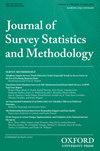在一个在线小组中为离线人口提供互联网接入:它会产生影响吗?
IF 1.6
4区 数学
Q2 SOCIAL SCIENCES, MATHEMATICAL METHODS
引用次数: 0
摘要
在线小组调查经常因无法覆盖离线人群而受到批评,这可能导致报道错误。先前的研究已经表明,非互联网用户实际上在几个社会人口学特征上与在线个人不同。为了减少由于错过离线人口而导致的覆盖误差,几个基于概率的在线面板为离线家庭配备了互联网连接和一台简单的电脑或平板电脑。然而,问题仍然存在,在线小组招募线下个人是否会导致调查估计的实质性变化。也就是说,目前尚不清楚从调查数据中得出的估计是否受到在线和离线个人群体之间差异的影响。在此背景下,我们研究了将以前离线的人口纳入德国互联网小组如何影响各种调查估计,如投票行为和社会参与。总的来说,我们发现很少有证据表明,为离线个人提供在线访问只会影响先前在线个人的估计。本文章由计算机程序翻译,如有差异,请以英文原文为准。
Equipping the Offline Population with Internet Access in an Online Panel: Does It Make a Difference?
Online panel surveys are often criticized for their inability to cover the offline population, potentially resulting in coverage error. Previous research has demonstrated that non-internet users in fact differ from online individuals on several sociodemographic characteristics. In attempts to reduce coverage error due to missing the offline population, several probability-based online panels equip offline households with an internet connection and a simple computer or tablet. However, the question remains whether the recruitment of offline individuals for an online panel leads to substantial changes in survey estimates. That is, it is unclear whether estimates derived from the survey data are affected by the differences between the groups of online and offline individuals. Against this background, we investigate how the inclusion of the previously offline population into the German Internet Panel affects various survey estimates such as voting behavior and social engagement. Overall, we find little evidence for the claim that equipping otherwise offline individuals with online access affects the estimates derived from previously online individuals only.
求助全文
通过发布文献求助,成功后即可免费获取论文全文。
去求助
来源期刊
CiteScore
4.30
自引率
9.50%
发文量
40
期刊介绍:
The Journal of Survey Statistics and Methodology, sponsored by AAPOR and the American Statistical Association, began publishing in 2013. Its objective is to publish cutting edge scholarly articles on statistical and methodological issues for sample surveys, censuses, administrative record systems, and other related data. It aims to be the flagship journal for research on survey statistics and methodology. Topics of interest include survey sample design, statistical inference, nonresponse, measurement error, the effects of modes of data collection, paradata and responsive survey design, combining data from multiple sources, record linkage, disclosure limitation, and other issues in survey statistics and methodology. The journal publishes both theoretical and applied papers, provided the theory is motivated by an important applied problem and the applied papers report on research that contributes generalizable knowledge to the field. Review papers are also welcomed. Papers on a broad range of surveys are encouraged, including (but not limited to) surveys concerning business, economics, marketing research, social science, environment, epidemiology, biostatistics and official statistics. The journal has three sections. The Survey Statistics section presents papers on innovative sampling procedures, imputation, weighting, measures of uncertainty, small area inference, new methods of analysis, and other statistical issues related to surveys. The Survey Methodology section presents papers that focus on methodological research, including methodological experiments, methods of data collection and use of paradata. The Applications section contains papers involving innovative applications of methods and providing practical contributions and guidance, and/or significant new findings.

 求助内容:
求助内容: 应助结果提醒方式:
应助结果提醒方式:


